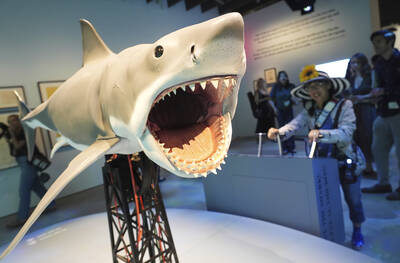“If the stars had a sound, it would sound like this.” A bold statement and the promotional plug for Scotland’s post-rock ensemble Mogwai, which plays live tonight at The Wall (這牆).
Taken from the opening sample of Yes! We Are a Long Way From Home on their debut LP Young Team, the line marks both a musical dawn and now a return to Taipei for the Glaswegian quintet, this time peddling their latest studio album The Hawk Is Howling.
Often likened to their better-known Icelandic peers Sigur Ros and the Canadian collective Godspeed! You Black Emperor, Mogwai — Martin Bulloch on drums, Stuart Braithwaite on guitar, Barry Burns on guitar and various instruments, Dominic Aitchison on bass and John Cummings on guitar — are master-craftsmen of richly detailed, layer-cake rock.
A miscellany of tone and style, The Hawk features the band’s climactic heights, rock action and lucidity that are found in varying degrees in its discography. A feature (or non-feature) most notable to first-time listeners would be the complete absence of lyrics or vocal melody.
Though The Hawk may be dissected in terms of style and form, without words Mogwai’s greater message remains clouded and is arguably better determined by the listener than the band.
Best-selling crime writer and fan Ian Rankin recently commented on the absurdity of describing Mogwai’s work. “It’s completely redundant ... Mogwai paint pictures in sound; no words needed,” he said.
Nonetheless we thought it worth offering them the chance. Last week, Stuart Braithwaite answered a few of our questions by e-mail.
Taipei Times: Which tracks have you been playing most on the tour? What goes down well?
Stuart Braithwaite: We’ve been playing six songs from the new record on tour as well as a few from each of our old records. I think that the song that has been best received has been Batcat.
TT: Can you tell me about your set list for Taipei? What should people expect who go to see you in Taipei?
SB: I don’t know yet exactly but probably 12 or so good Mogwai songs with very few mistakes.
TT: What do you perceive to be the highs and lows of your output to date and what have been the biggest factors in shaping that?
SB: I think that we’ve mostly kept quite a high standard in our records but my favorites are Come On Die Young and Happy Songs for Happy People. I think that the reason for those being so good was that they were fun to make, which makes a big difference.
TT: Mogwai’s largely vocal-less cinematic sound seems to embody a faceless sense of romance, yet in past interviews band members have come across as very grounded. How do you think a relatively down-to-earth bunch of people have ended up generating such fantastical music?
SB: I genuinely have no idea. Scottish people are quite down to earth, though I think we have a romantic element too, but are a wee bit shy about it.
TT: Would you agree that your music has a sense of romance about it or not? Is it deliberate?
SB: I do agree but don’t think it’s particularly deliberate. We have a very natural way of writing and recording music which means we don’t tend to think about it too much.
TT: Is there a Mogwai album methodology? Or is every LP conceived differently? What is unique about The Hawk?
SB: We have methods, but they aren’t particularly thought out. They are more habits really. The new record has no vocals, but other than that it wasn’t conceived very differently from the other records.
TT: What music are you listening to at the moment?
SB: I’m listening to a lot of old blues like Blind Willie Johnson, Skip James, Washington Philips and people like that.
TT: What’s happened to post-rock? How do you see the genre evolving? What relatively unknown bands that fall into the post-rock category should we be looking out for?
SB: I think it will continue with a bunch of bands badly copying us and Godspeed.
[This interview has been edited and condensed.]

The depressing numbers continue to pile up, like casualty lists after a lost battle. This week, after the government announced the 19th straight month of population decline, the Ministry of the Interior said that Taiwan is expected to lose 6.67 million workers in two waves of retirement over the next 15 years. According to the Ministry of Labor (MOL), Taiwan has a workforce of 11.6 million (as of July). The over-15 population was 20.244 million last year. EARLY RETIREMENT Early retirement is going to make these waves a tsunami. According to the Directorate General of Budget Accounting and Statistics (DGBAS), the

Last week the story of the giant illegal crater dug in Kaohsiung’s Meinong District (美濃) emerged into the public consciousness. The site was used for sand and gravel extraction, and then filled with construction waste. Locals referred to it sardonically as the “Meinong Grand Canyon,” according to media reports, because it was 2 hectares in length and 10 meters deep. The land involved included both state-owned and local farm land. Local media said that the site had generated NT$300 million in profits, against fines of a few million and the loss of some excavators. OFFICIAL CORRUPTION? The site had been seized

Sept. 15 to Sept. 21 A Bhutanese princess caught at Taoyuan Airport with 22 rhino horns — worth about NT$31 million today — might have been just another curious front-page story. But the Sept. 17, 1993 incident came at a sensitive moment. Taiwan, dubbed “Die-wan” by the British conservationist group Environmental Investigation Agency (EIA), was under international fire for being a major hub for rhino horn. Just 10 days earlier, US secretary of the interior Bruce Babbitt had recommended sanctions against Taiwan for its “failure to end its participation in rhinoceros horn trade.” Even though Taiwan had restricted imports since 1985 and enacted

Take one very large shark, a boat (we’re gonna need a bigger one of those) and a movie that ran way over budget and you’ve got all the ingredients of a career-making film for one of Hollywood’s most successful directors. Now fans of Jaws — Steven Spielberg’s terrifying thriller about a man-eating shark — can re-live the movie as it celebrates its 50th anniversary in an exhibition at the Academy Museum in Los Angeles. “The film certainly cost me a pound of flesh, but gave me a ton of career,” Spielberg told reporters as he toured exhibits of props and memorabilia